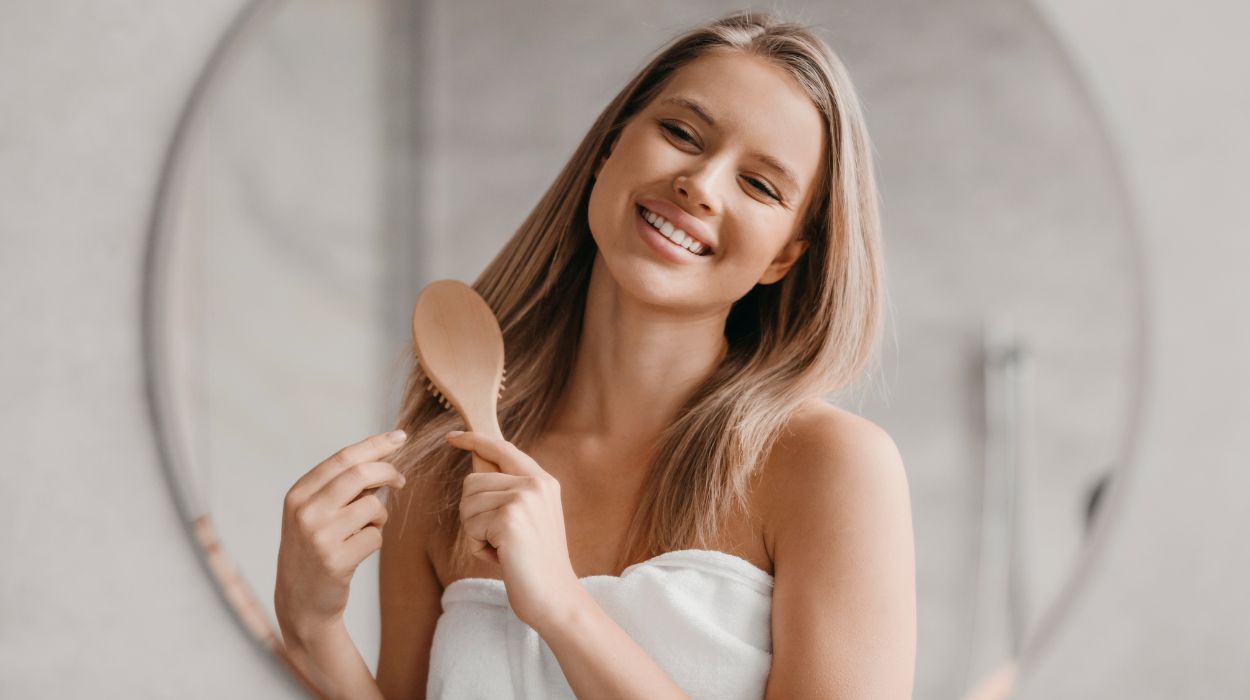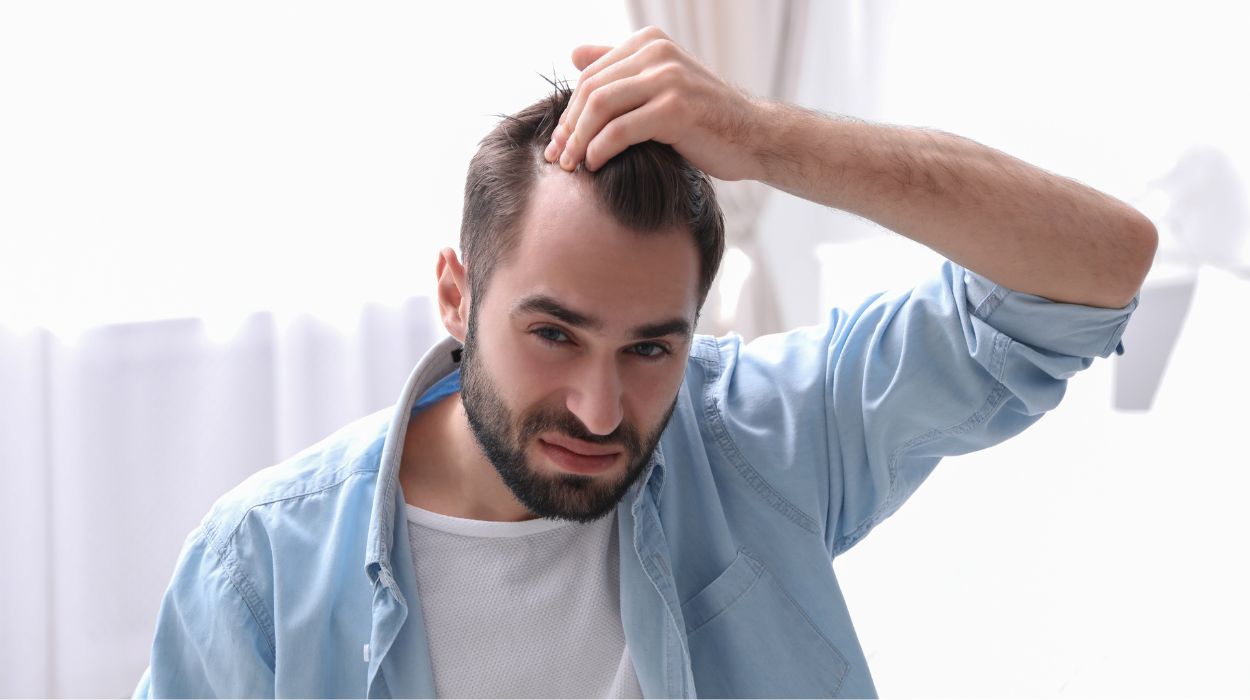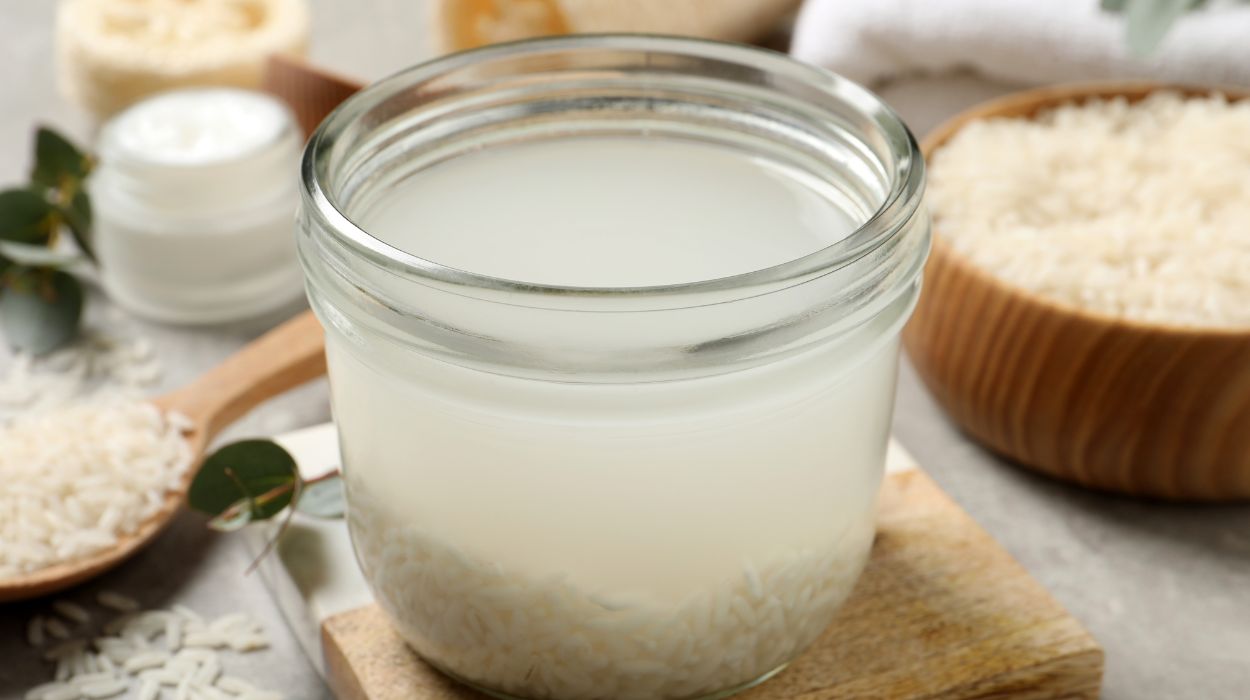Rice water is exactly what it sounds like – the water that’s left over after soaking or cooking rice. Once soaking or cooking is complete, you can strain out the water and set the rice aside. The milky water can be used as a hair conditioner to encourage hair growth, increase shininess, and add softness to the hair[1]. The minerals and starches that get absorbed into the water from the rice are responsible for its powerful hair and skin health benefits – benefits that Japanese and Chinese cultures have been using for centuries.
How To Use Rice Water For Hair
Rice water can be used after shampooing and conditioning, or in place of your usual hair conditioner – there’s no right or wrong – it’s whatever you prefer. You can use rice water as often as you would normally wash your hair, and in return can expect stronger, shinier, and smoother hair. The preferred method for using it on hair is while the hair is clean and wet (after shampooing and rinsing) while in the shower. Start by rubbing it into the scalp and work your way outwards.
Instructions To Make Rice Water At Home
Ingredients
To make rice water, you’ll need just two ingredients: rice and water (one cup of each). You can use any type of rice you wish, although there’s some evidence to suggest that long-grain white rice has just the right amount of protein to make ideal rice water.
Guidelines For Soaking
You’ll want to rinse the rice before you soak it, to clean off any dirt or unwanted pesticides. From there, add one cup of rice to a bowl and mix it with one cup of water, then let it soak for thirty minutes. You may wish to give the rice a stir and keep stirring until the water becomes milky.
Remove Rice and the Save Water
Now that the water is cloudy, go ahead and strain the water to separate out the rice. You can either cook the rice or throw it out – up to you! The water is what you’re after! Put the water in a small container, cover it, and keep it at room temperature anywhere between 12-24 hours. During this time period, the water will ferment which allows even more vitamins and minerals to seep into the water. After that, store it in the fridge until you’re ready to use it.
If you don’t wish to ferment the water, you do not need to leave it out overnight. You can use the water after 30 minutes of soaking.
Cooking Rice Instead of Soaking
Rather than using cold water to soak rice in, you may wish to cook rice and use the leftover water from the pot. This is a perfectly acceptable way to make rice water if you want to kill two birds with one stone: make rice for dinner and rice water for your shower!
If this is the case, cook rice as you normally would, except add more water to the pot than you need. For example, if you use two cups of water for every one cup of rice, use three or four cups of water instead, then when the rice is soft enough, you’ll still have plenty of water left over. Drain and save the water. Let it cool, then either leave it out to ferment or use it sooner. Don’t forget to enjoy your rice, too.
Which Is Better? Plain Rice Water Or Fermented Rice Water?
Some research indicates that fermented rice water[2] may be more beneficial than plain rice water. Fermented rice water contains more antioxidants, which are responsible for helping to repair damaged cells. This is why antioxidants are so abundant in beauty products and why eating a healthy diet filled with antioxidants is part of beauty regimes. To ferment the rice water, once the rice is removed, keep the water out for a day or two before storing it in the fridge and then using it. Otherwise, you can use the water right after it’s soaked, unfermented.
Benefits Of Using Rice Water For Hair
Strengthen Your Hair

Using rice water on the hair is a topical way to reap the nutritional benefits of rice. A number of nutrients can be obtained from rice, including vitamins B and C, magnesium, selenium, phosphorus, and amino acids – all of which help to strengthen hair and hair follicles. A trick is to use rice water on your scalp first, massaging it in, then working your way outward, rubbing it into your hair.
Beautify Your Hair
In addition to strength, you can add beauty to your hair by using rice water. The benefits of rice water include more hair volume and shine. You may also find that the texture of your hair improves, more specifically, it will become softer and smoother, with less frizz and brittleness.
Promote Hair Growth

If increasing hair growth[3] is what you’re after, rice water can help with this as well. The amino acids in rice water serve as building blocks for the proteins that make up hair – in other words, rice water helps to encourage hair growth from the roots up. This is good news for those with thinning or shedding hair. The inositol in rice water, in particular, may be correlated with the prevention of hair loss.
May Reduce or Prevent Grays
The antioxidants[4] that seep into the water after soaking rice may be responsible for helping to prevent premature graying. This is said to work via the rice water removing toxins that can build up on the scalp, which would otherwise damage hair and hair follicles.
Improves Skin
The same properties in rice water that make it so beneficial for hair make it equally beneficial for the skin. Rice water can be used as a cleanser and toner, and can help reduce the appearance of dark spots and acne. Rice water can help to brighten, firm, and soften the skin. Using it in place of store-bought cleansers and creams means less plastic, less toxins, less waste, and more natural beauty. Some research also suggests that bathing in rice water a few times a day can enhance the skin’s ability to heal itself, particularly in cases of eczema.
Side Effects Of Using Rice Water For Hair
Because rice water is not meant to be ingested, there are little known adverse reactions one might have when using it. However, if you have a rice allergy, it’s possible that coming into contact with rice water may irritate your skin or cause other allergic reactions. Though rice water can help relieve inflamed skin in those with eczema, in some individuals, adding any moisture may aggravate it.
Depending on your hair type, you may have less noticeable results. When it comes to using rice water, results will definitely vary, especially if your hair is less porous (unable to absorb as many nutrients).
Drying of the hair and scalp may also occur if you overuse rice water. Pay attention to this. If this is the case, you may need to reduce the frequency of usage. In fact, you may get the opposite effects you’re looking for – dry instead of moisturized, frizzy instead of smooth – if you overuse rice water. Some believe it’s fine to use rice water on your hair as often as you would normally wash your hair, even if that’s every day, while others think it’s best not to use it more than twice a week. Experiment to see what works best for you.
Conclusion
Ancient Japanese cultures have used rice water for the same reason that some modern Chinese cultures do – it improves the quality and strength of hair and skin. The rice water trend has since traveled to all parts of the world. Though little scientific evidence is available to support the claims about rice water’s benefits, there’s something to be said about this home beauty regime standing the test of time. The vitamins, minerals, amino acids, and starches from the rice get absorbed into the water, and in turn, absorbed into the scalp, hair, and skin, offering benefits ranging from increased hair growth, strength, smoothness and shine, to warding off premature grays.
Frequently Asked Questions
Any rice, brown or white, wild, basmati, or jasmine is a good option to make rice water. There’s some evidence to suggest that long-grain white rice might be better than other types of rice, but it shouldn’t make too much of a difference.
Fermented rice water contains more nutrients than plain water, however, depending on the results you’re trying to achieve, it may not be necessary to ferment the water.
Yes – no need to throw it away. You can cook the rice in a separate batch of water and enjoy! Or, you can make rice water by using the water from cooking rice.
There should be no harm in trying, however, eczema is a serious condition that may have many root causes. It’s best to get to the root cause of the inflammation and heal that way, rather than rely solely on rice water as a remedy. Rice water may help relieve mild redness and itching, however, it’s not a guarantee that it will work for everyone. Consult with your doctor.
 Expert's opinion
Expert's opinion
